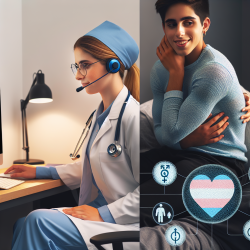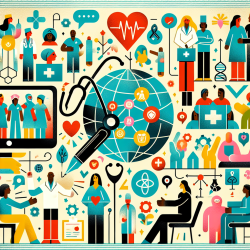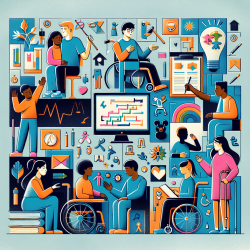Introduction
As a speech-language pathologist with a focus on data-driven decisions, I am always on the lookout for innovative approaches that can improve outcomes for children. The recent research titled "Outcomes Research on Telemedicine-Delivered Gender-Affirming Health Care for Transgender Youth Is Needed Now: A Call to Action" by Stewart et al. offers valuable insights into the use of telemedicine for providing gender-affirming health care (GAH) to transgender youth. This blog post aims to help practitioners enhance their skills by implementing the outcomes of this research and encourages further exploration in this critical area.
The Need for Telemedicine in Gender-Affirming Care
Transgender and gender nonconforming (trans/GNC) youth face numerous challenges, including higher rates of depression, suicidality, and stigma-related violence compared to their cisgender peers. Access to gender-affirming care is crucial for improving their mental and physical health outcomes. However, many trans/GNC youth, particularly those in rural areas, face significant barriers to accessing such care. Telemedicine has emerged as a promising solution to bridge this gap, offering a means to deliver care to underserved populations.
Key Findings from the Research
The research by Stewart et al. highlights the limited studies available on telemedicine-delivered GAH for trans/GNC youth. Despite the scarcity of research, the existing studies suggest that telemedicine is an acceptable and effective mode of delivering GAH. Key findings include:
- Transgender youth express interest in telemedicine for GAH, particularly those with lower levels of perceived parental support.
- During the COVID-19 pandemic, telemedicine became a vital tool for delivering GAH, with many patients reporting satisfaction and comfort with virtual visits.
- Telemedicine offers benefits such as time savings and increased safety, although concerns about privacy and technology remain.
Implications for Practitioners
For practitioners, these findings underscore the importance of incorporating telemedicine into their practice to improve access to GAH for trans/GNC youth. Here are some steps practitioners can take:
- Training and Education: Enhance your understanding of telemedicine technologies and their application in delivering GAH. This may involve attending workshops, webinars, or pursuing certifications in telehealth.
- Collaboration: Work closely with multidisciplinary teams, including mental health professionals, to provide comprehensive care to trans/GNC youth.
- Advocacy: Advocate for policy changes that support the use of telemedicine for GAH and address regulatory and reimbursement challenges.
- Research and Evaluation: Engage in research to document the impact of telemedicine on health outcomes for trans/GNC youth and share findings with the broader community.
Encouraging Further Research
While the current research provides a foundation, there is a pressing need for more studies to fully understand the impact of telemedicine on GAH for trans/GNC youth. Practitioners are encouraged to contribute to this growing body of knowledge by conducting research that explores:
- The long-term health outcomes of telemedicine-delivered GAH.
- The experiences and satisfaction levels of trans/GNC youth and their families with telemedicine services.
- The barriers and facilitators to implementing telemedicine in different settings.
By actively participating in research and sharing insights, practitioners can play a pivotal role in advancing telemedicine as a viable option for delivering GAH to trans/GNC youth.
Conclusion
The use of telemedicine in delivering gender-affirming care to transgender youth holds great promise for improving access and outcomes. As practitioners, it is crucial to embrace this technology, enhance our skills, and contribute to the research that will shape the future of GAH. By doing so, we can ensure that all youth, regardless of their location or identity, receive the care they deserve.
To read the original research paper, please follow this link: Outcomes Research on Telemedicine-Delivered Gender-Affirming Health Care for Transgender Youth Is Needed Now: A Call to Action.










